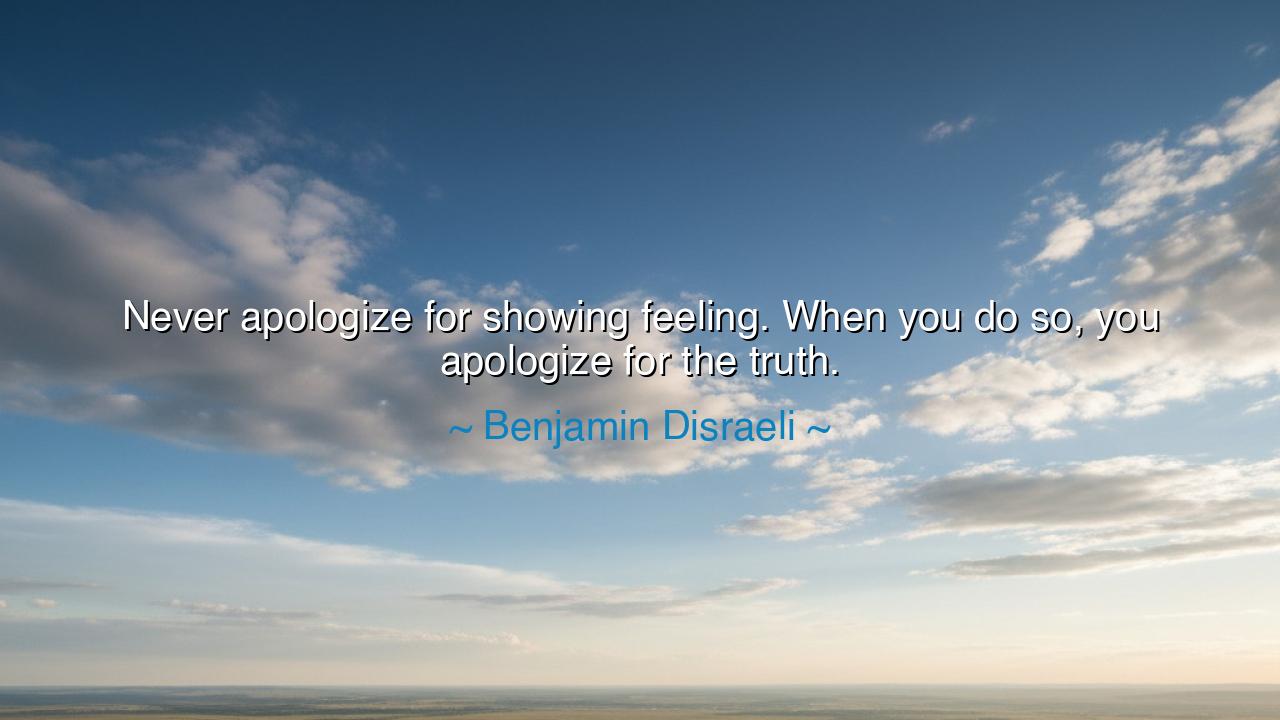
Never apologize for showing feeling. When you do so, you






Benjamin Disraeli, the great statesman and writer of nineteenth-century England, once declared: “Never apologize for showing feeling. When you do so, you apologize for the truth.” These words burn with timeless fire, for they strike at the very heart of human existence. Too often men and women are taught to bury their emotions, to wear masks of indifference, to pretend that the inner life is weakness. Yet Disraeli saw that to suppress feeling is to suppress what is most real, for truth lives not only in reason but in the soul’s response to the world.
The ancients knew this as well. In Homer’s Iliad, mighty Achilles, the greatest warrior of Greece, wept over the death of his beloved friend Patroclus. Did his tears diminish his greatness? No—they revealed the depth of his humanity. In his sorrow we see the truth of love, the truth of loss, the truth that even the strongest heart bleeds. To apologize for such feelings would be to deny reality itself. Thus Disraeli, though a politician in an age of restraint, dared to affirm the sacredness of showing emotion.
History gives us countless examples of this wisdom. Consider Abraham Lincoln, who during the ravages of civil war was not ashamed to grieve openly. Letters reveal his tears for the suffering of the soldiers and his anguish over the nation’s wounds. Far from weakening him, these expressions of feeling deepened his moral strength. His humanity made him a leader whom others could trust. If he had hidden his sorrow, if he had apologized for it, the truth of his compassion would have been lost to history.
There is danger in denying one’s feelings. For when people bury them, they bury also their honesty, their connection to others, and their own wholeness. The mask of indifference may seem strong, but it is brittle. It shatters when tested. Only the one who embraces truth in emotion—whether it be joy, grief, anger, or love—stands unshaken, for such a person lives in authenticity. This is why Disraeli warns: to apologize for feeling is to apologize for being alive.
The meaning of this quote is therefore heroic. It calls upon us to live without shame in the presence of our own hearts. When love stirs within you, speak it. When grief breaks you, allow it. When anger at injustice flames, do not silence it. These are not flaws—they are the truth breaking through the shell of convention. To deny them is to betray the self, but to express them is to walk in courage.
The lesson for us is luminous: let us not confuse vulnerability with weakness. To show feeling is to show courage, for it risks rejection and misunderstanding. But in truth it opens the path to deeper bonds, to honesty, to freedom. The world has enough masks; it needs more faces revealed. The world has enough silence; it needs more voices speaking with heart.
Practical action follows easily. Do not say “I’m sorry” when your eyes fill with tears, or when your laughter is too loud, or when your voice trembles with passion. Instead, recognize these moments as sacred. Honor them. Likewise, when others reveal their feelings, do not shame them but receive them with reverence. In this way, you create a world where the truth of human experience is celebrated, not hidden.
Thus, remember Disraeli’s wisdom: “Never apologize for showing feeling. When you do so, you apologize for the truth.” The mask may win you approval, but only authenticity will give you peace. Be bold, be honest, be fully alive. For in your unguarded feelings shines the eternal truth of what it means to be human.






THTran Huy
I wonder if Disraeli's statement encourages us to embrace our feelings unapologetically, but could that also create situations where our emotions cloud our judgment? Is it always wise to let our feelings lead, or should we sometimes step back and assess a situation logically before reacting emotionally? How do we ensure that showing our feelings doesn’t become an excuse for avoiding uncomfortable truths or difficult conversations?
NQHo Nhu Quynh
This quote brings up the question of vulnerability and truth. If we’re always honest about our feelings, does that make us more authentic, or does it risk us coming off as overly emotional? Is it possible to be truthful and emotionally composed at the same time? Does Disraeli imply that emotions are inherently truthful, or are we sometimes just expressing what we want to believe is true, even if it's not?
NNNguyet Le Nguyen Ngan
Disraeli’s quote challenges us to think about emotional expression as something pure and truthful, but does this apply to all feelings, or only certain ones? Is it always appropriate to show our feelings, or are there times when it's better to hold back? For example, could expressing anger or sadness in a moment of stress actually distort the truth, even if those emotions are valid? Where do we draw the line between honesty and emotional restraint?
BBxbdhdhdhdhd
I find it interesting that Disraeli ties apologizing for feelings to apologizing for the truth. But do emotions always reflect the truth, or are they sometimes misled by personal biases or misconceptions? Is it possible that apologizing for feelings can actually be a way of protecting our truths, especially when they’re vulnerable or misunderstood? How do we determine whether our emotions are truly a reflection of truth, or just an emotional reaction to a situation?
BBBap Bap
This quote by Disraeli suggests that feeling emotions should never be seen as something shameful. But can we always trust our feelings to reflect the truth? Are there times when showing too much emotion might obscure the facts or make things worse? Could there be situations where controlling our emotions is more important than displaying them freely? How do we balance honesty with emotional expression without over-apologizing for how we feel?